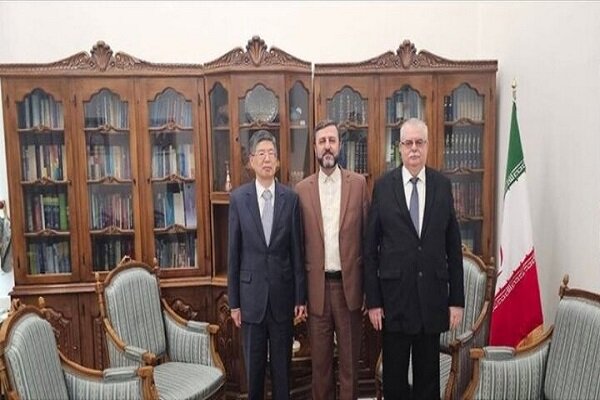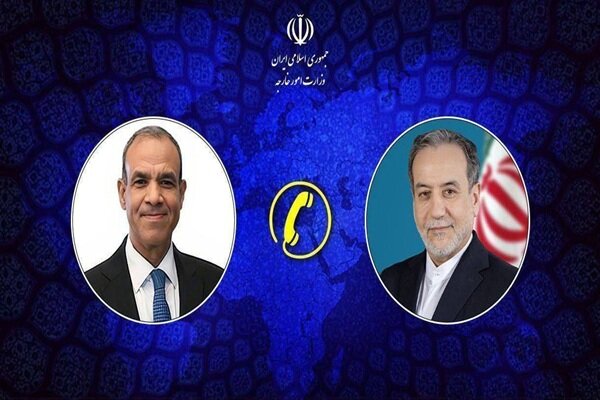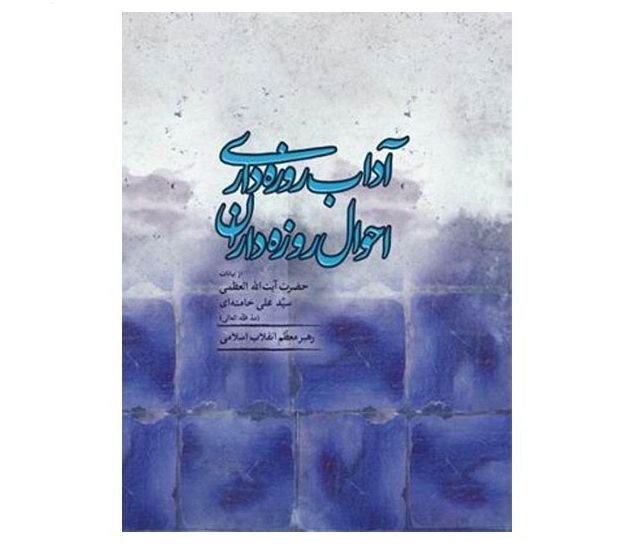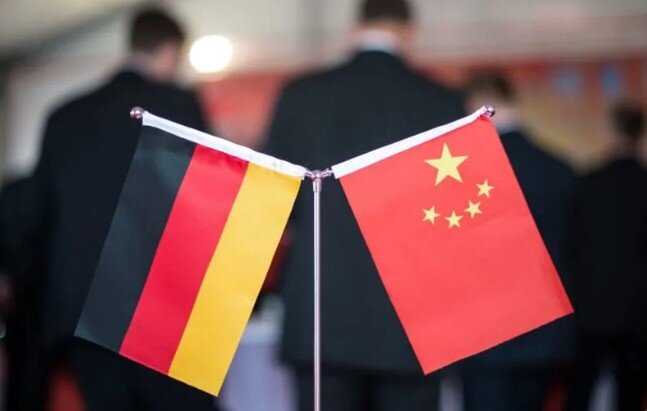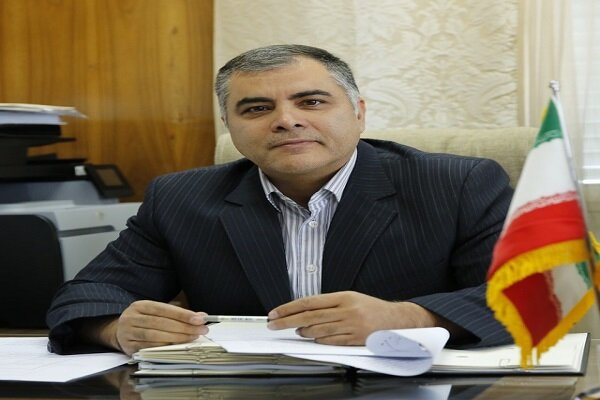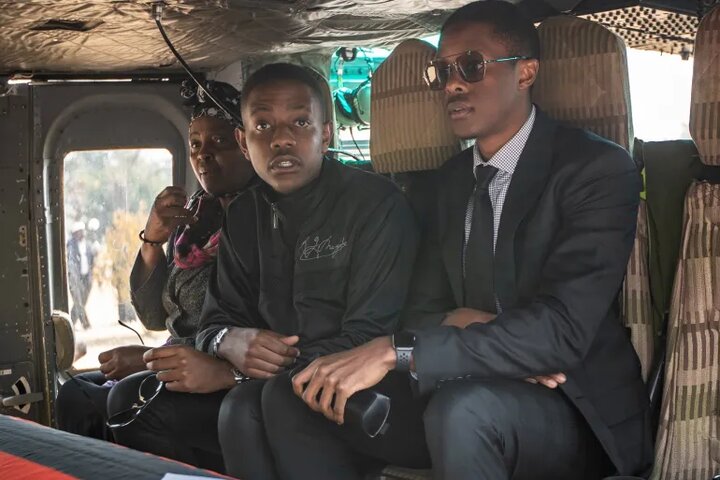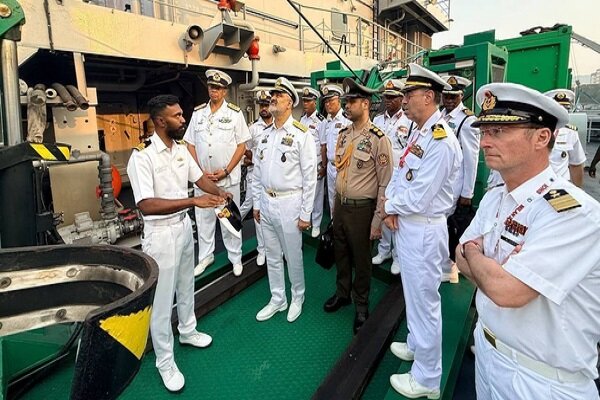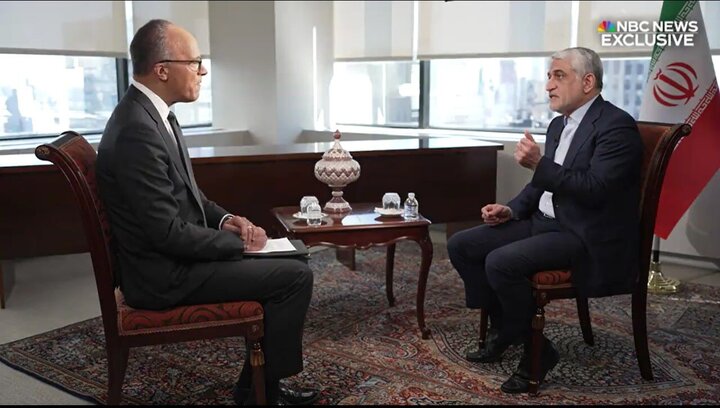
Iran’s Ambassador and Permanent Representative to the United Nations Amir Saeid Iravani says Iran’s policy regarding the latest developments in the Western Asia region is to control the regional situation and to not let things get out of hand while insisting that using the language of threat against Iran will go nowhere.
Iravani made the remarks in an interview with the NBC News which was published on Wednesday.
“Our policy is to control the situation. We never want to spill over the conflict in the region. We want to keep the situation in the region calm and ease the tensions,” he said in the interview.
The ambassador reiterated that resistance groups in the region that have been attacking US and Israeli targets are totally independent in their moves and decisions, saying that the root cause of the conflict in the region is the Israeli way of treating the Palestinians.
Following is the full texts of Iravani’s interview with the NBC News based on a version provided by Iran’s UN mission in New York:
Lester Holt: Ambassador, thank you for agreeing to sit down with us. I think your Government and the U.S. administration would agree that this is becoming an increasingly dangerous time in the Middle East. Can you tell us what your government is prepared to do to turn down the heat?
Ambassador Iravani: We should consider the root causes of this conflict. Without paying attention to the root cause, we cannot find a solution for that. We understand that the root causes are the actions of the Israeli regime in the region that are related to the occupation, usurpation of the Palestinians’ lands, and the violation of their rights. So, if we want to solve the problems and have tranquility in the region, we should address the root causes of the conflict. Our policy is to control the situation. We never want to spill over the conflict in the region. We want to keep the situation in the region calm and ease the tensions. It is however not a one-sided relationship, the other side should also control the situation, after which we may see a calm situation in the region.
Lester Holt: At this immediate moment, what can Iran do? What is Iran doing to try and ease some of the tensions, to walk a little further away from the risk of war?
Ambassador Iravani: I think that the immediate solution should be the ceasefire in Gaza. After the ceasefire, we can understand how we can manage the situation in other parts of the region.
Lester Holt: Will the attacks end if there is a ceasefire in Gaza?
Ambassador Iravani: Yeah. It should be a permanent, durable, and full ceasefire in Gaza, and the aggression and genocide perpetrated by the Israeli regime there must stop. After that, humanitarian assistance must be sent to the Gazans, then the exchange of prisoners, and also the reconstruction of Gaza would be the next steps.
Lester Holt: Much of the conversation centers on the level of control or influence that the Iranian government has over these groups, i.e., the Houthis and other groups. If you pick up the phone, can you end the attacks?
Ambassador Iravani: In order to understand the issue, I may say that the relation between Iran and resistance groups in the region could be compared to NATO. In NATO, there is Article 5. If any member of NATO faces army aggression, the other can choose to react individually or collectively. Our relationship with the resistant groups may be considered within this framework as well.
Lester Holt: So, there is somehow a defense pact?
Ambassador Iravani: Yeah, that’s some sort of a defense pact between resistance groups and Iran. They have their own decisions, choices, benefits, and interests, but they have general coordination and collaboration with each other. When one part of the system has been damaged and faced aggression by the Israeli regime, the other parts of the resistant system will have their own reaction to support, to show their sympathy towards the Palestinian people. It is not related to a phone call to the Houthis. It is the fact that they feel the responsibility to defend their brothers and sisters in Gaza.
Lester Holt: How far does your support for these groups go? Are you arming them?
Ambassador Iravani: We have explicitly said that with regard to the case of Palestine, we send them arms, we provide them training, and we empower them. But with the other resistance groups in the region, we have some coordination, cooperation, consultation, and maybe some financing as well.
Lester Holt: In the Houthi attacks that we have seen on commercial shipping, there are sophisticated weapons. Is Iran supplying those weapons?
Ambassador Iravani: Not at all.
Lester Holt: Does Iran tell them how to use such weapons?
Ambassador Iravani: It is totally related to them. They have their own weapons. You have to understand that they have been under the war for eight years. They have lots of experience, they could overcome their shortcomings, and they are self-reliant and self-deterrent.
Lester Holt: Would Iran prefer the Houthi attacks against commercial shipping and threats against U.S. naval vessels, do you wish those would stop?
Ambassador Iravani: Yeah, we encourage all of them to stop the situation. we don’t want a crisis in the region.
Lester Holt: So, you are encouraging them to stop?
Ambassador Iravani: We are encouraging them to stop. But I have already said that it’s a two-way road. One side cannot do it alone, the other side should fulfill the responsibility in this case. We encourage them to stop, and we expect that the other side also encourages the Israelis to stop.
Lester Holt: Let’s talk about the American position. President Biden believes that Iran was indirectly involved in the attack in Jordan that killed three American service members and wounded many more. The United States has not militarily targeted Iran, but some believe the door is open for that. How do you foresee the reaction would be from Iran if the U.S. were to attack Iran or Iranian interests directly or indirectly?
Ambassador Iravani: Our argument is the same as the U.S. What does the U.S. say? The U.S. says that they are weaponizing Israelis for the war, they say they are providing what the Israelis need for the war. They do not hesitate to say it openly. In our case, our argument is the same. We help them, we assist them in defending against the occupiers. That is the same argument. We are not involved directly or indirectly. We have no control or command over any resistance groups. It’s their own decisions, it’s their own recognition of what they have to do according to their own interests and benefits.
Lester Holt: But, let’s get back to the question of the U.S. response. If there is an American attack on Iran or Iranian interests, how do you foresee the reaction would be?
Ambassador Iravani: Iran will absolutely react. We have already said it clearly that if they attack Iran’s soil or Iranian benefits or individuals all around the world, we have our own reaction. We will absolutely defend. We will give a resolute response to any aggression.
Lester Holt: Do you think the risk of war is growing?
Ambassador Iravani: Yes.
Lester Holt: How do you see it? Explain to me how you see the situation right now leading to war.
Ambassador Iravani: Let me tell you a story: people saw a person falling into the river. they went there and saved that person. After a minute, they saw another person falling into the river. They rescued him as well. They saw that the same incident was being repeated again and again and again. They asked what’s the root cause of this incident. They saw a madman standing on the bridge and he was throwing everyone who was passing the bridge into the river. So, they caught the madman, and the conflict and problem were solved. In this case also, if we want to solve the problem, we should catch the madman in this conflict. After that, we can expect that the conflict in other parts of the region will be ended. The Houthis have been under the war for 8 years, never have they ever posed any danger to the Red Sea. What we are seeing now is only in response to and after the aggression of the Israeli regime against the people of Gaza and the genocidal crimes committed against the Palestinians. There is a terrible statistic in Gaza: 100,000 people have been killed and wounded, thousands are under the rubble, tens of thousands of homes have been destroyed, and there is complete famine there. So, it will be a natural reaction of the people, not only the Muslims, not only the resistance groups, but any awakened conscience in the world. They have their own reactions. You have also people in the United States who are not Muslims and are even Jews who have reacted and protested against the Israeli actions and US policies to support the Israelis.
Lester Holt: What does it have to do what targeting and attacking commercial ships in the Red Sea?
Ambassador Iravani: The Houthis say they are targeting Israeli ships and any ship transferring goods and commodities to or from the Israeli regime. So, the target is very clear. It is against the Israeli regime.
Lester Holt: So, do you support what they are doing?
Ambassador Iravani: Yes. We support this. Because the other side has placed a blockade on Gaza. As long as they’re not allowing the delivery of fuel, goods, and commodities to people in Gaza, why should they be free to transfer goods, fuel, and machine guns to the Israelis?
Lester Holt: I just want to be very clear. You said you approve of Houthis targeting commercial ships?
Ambassador Iravani: Against the Israelis, not others.
Lester Holt: Curiously your government put out a warning against the U.S. within the last few days about targeting or sinking an Iranian flag vessel. According to our tracking, this vessel tends to appear around the same time that there are attacks against commercial shipping. Is it an intelligence or spy vessel transmitting information to the attackers?
Ambassador Iravani: No. Our vessels in the Mediterranean and the Red Sea are supportive vessels. They support our ships in the Mediterranean and the Red Sea and combat piracy there. We have not provided any information to support the Houthis in this regard.
Lester Holt: I am just curious why you warned about attacking this specific ship. Does this ship hold more value?
Ambassador Iravani: The ship’s mandate is to only support the Iranian shipment in the Red Sea and the Mediterranean.
Lester Holt: You’ve talked a lot about the linkage to what is happening in Gaza. In your view, was the October 7th attack by Hamas militarily wise?
Ambassador Iravani: We cannot read this book from the middle pages. This story did not start on October 7th. It goes back to 75 years of humiliation and occupation of Palestinian rights. The Israelis have deprived the Palestinians of inherent rights. So sometimes it is a natural reaction of the people.
Lester Holt: Did it occur with or without the encouragement of Iran?
Ambassador Iravani: We have not participated in this decision. It was a Palestinian decision, implemented by Palestinians. We have neither directed nor played any role in this case. But we support some part of their action to preserve their rights, to push back the occupiers, to evacuate and liberate their lands. Yes, we support these goals.
Lester Holt: So back to the question, did Iran arm Hamas with knowledge?
Ambassador Iravani: Not for any specific operation. We armed all the Palestinians, not only Hamas. Our Leader has said very clearly that everyone with intentions to stand against Israeli occupiers can count on our support.
Lester Holt: If the U.S. were able to convince Iran to end its military actions in Gaza, how quickly do you think things could change elsewhere in terms of the attacks on Americans and commercial shipping?
Ambassador Iravani: The majority of this conflict started after the invasion of the Israeli regime in Gaza on the 7th of October. If they stop this and bring remedy to the root cause of this crisis, then we can expect other conflicts in the region to find a solution to be resolved.
Lester Holt: Qatar and Egypt, as you know, have been involved in some of the negotiations toward a ceasefire. Do you think there is an acceptable solution that would allow freedom for the hostages?
Ambassador Iravani: I think so. But we are not aware of the details of negotiations taking place in Cairo and Doha, but we think that Hamas has its own readiness to exchange. But they have their own conditions. After the 7th of October, more than 5 or 6,000 new people in Gaza and West Bank have been arrested. The number of Palestinian prisons in the Israeli jails is more than 10,000. So, they expect the release of their prisoners. We cannot expect that only the hostages should be released. Sometimes we hear that some children have been killed in this conflict. It is sad and heartbreaking for all of us. But we also know that more than 10,000 children have been killed by the Israelis on the other side. We should also show our sympathy towards them as well.
Lester Holt: Can you tell me your government’s view of the normalization of relations between Saudi Arabia and Israel?
Ambassador Iravani: I think it is not going to be feasible in the near future. We have heard that one of their conditions is the establishment of an independent Palestine. I think that the current Israeli regime’s administration cannot accept an independent State for the Palestinians.
Lester Holt: Let me get your thoughts on to what extent you think Iran benefits from the instability right now that is happening in so many places. The U.S. has been very busy right now, responding to shipping attacks and diplomatic efforts. Does your country benefit from instability?
Ambassador Iravani: Not at all. Our benefit will not be in the instability, but stability and security in the region. But we think that the stability and security in the region will be on the shoulders of the regional countries, not those who have come from far away.
Lester Holt: This is a big question: what does Iran want from the United States?
Ambassador Iravani: You know that after the Revolution and over the last 45 years, you have had eight U.S. presidents, half of whom were Democrats and the other Republicans. Only during the Obama administration, he considered and recognized Iran, and used the full title of the Islamic Republic of Iran. He emphasized on mutual respect and benefit. He sent a respectful letter to the Supreme Leader, and he received a written response once. So, we do not want to have any tensions with the United States. Maybe even we define some common goals as well. In Iraq and Afghanistan, the collapse of the Saddam regime and the rule of the Taliban in 2001, at that time we had the same goal but different strategies. We insisted on empowering resistant groups in Iraq and Afghanistan, but they chose military aggression against Iraq and Afghanistan. The goal was the same and common between the United States and Iran, but the strategy was different.
Lester Holt: Some have noted that a little softening of the language is occurring in terms of the risk of war or if the U.S. attacks directly. Iran’s language seems to be less strong than I might have heard at another time. Is there a change of view in terms of how Iran sees itself with the U.S. and the potential for war?
Ambassador Iravani: I think that the language of threats will not work against Iran. The language of cooperation and respect will only work with Iran. If you think that Iran is afraid of the threats, you are absolutely wrong. Iran was under the war for 8 years. We are not afraid of war, but we will never welcome it. We will not initiate any war against any country, but we are prepared to defend our security and interests. So, we are not welcoming the war, but if the other side starts it, they will see a prepared Iran.
Lester Holt: Many think that the U.S. is sending a very strong message with its retaliatory attacks that have been going on for the past several days, by launching not only traditional cruise missiles but long-range bombers that take off from the United States and go all the way to the Middle East. The message to Iran is: watch our capabilities. Do you take it that way?
Ambassador Iravani: No. The so-called strong message to Iran will not work. I have already told you that we have been in the war. We are not afraid of any threats from any side. The collaboration and solidarity in Iranian societies will be increased after any foreign threats.
Lester Holt: Just one more question: often we hear the term “proxy” groups attacking on behalf of Iran. How do you see these groups? Do you see them as proxies to push for your will?
Ambassador Iravani: The term proxy is to mislead public opinion. They’re not proxies, they are resistance groups. Their rights have been recognized under international law. The resistance groups have the right to self-determination and to resist against the occupying regimes. So, they are not our proxies.
Lester Holt: But are they not supported and to some extent, directed by Tehran?
Ambassador Iravani: No. I may have to repeat that we are not directing or commanding them. We have common consultations with each other. Our relationship with the resistance groups is like NATO members. They have consultation with each other, but the reaction of each member is not the same as others. During our fight against ISIS in Syria and Iraq, the Palestinian resistance groups did not get involved, why? Because it was not their priority. We recognized that. It was their own decision. But other parts of the resistance system joined in the fight against ISIS in Iraq and Syria. So, they have their own priorities and interests. They have good, common, and close collaboration and cooperation with each other.
Lester Holt: But you are Iran. You have the influence to help direct them. Are you in active discussion with any of these groups?
Ambassador Iravani: You are repeating about Iran directing and influencing them. No, we have no influence over them. We have common goals and understanding. I may not use the term influence. We have consultations with each other. We exchange considerations about what is the condition of the situation in the region and what we should do together.
Lester Holt: Are there any backchannel communications between Tehran and Washington that are actively underway?
Ambassador Iravani: There have always been channels, either through the U.S. interests section at the Swiss Embassy in Tehran or through mediatory countries and individuals. There have always been channels to exchange messages and views.
Lester Holt: Is it more important than ever though that there are some discussions?
Ambassador Iravani: We have already had talks and discussions. According to our religious teachings, a wise cannot be bitten twice from the same hole. It means that if you have a failed experience from engagement with one party, you cannot engage once more with that man on the same issue. We have had discussions. During this U.S. administration, we have had lots of discussions. We reached a framework of understanding for the release of prisoners, our assets unlawfully frozen by the United States in South Korea, and negotiations on how to revive the JCPOA. We concluded all those discussions, and we implemented them. But unfortunately, the U.S. refused to fulfill its responsibilities in certain parts. So, it is difficult to again resume those failed discussions.
Lester Holt: Mr. Ambassador, as we are speaking, I was handed a message on phone here that the Prime Minister of Qatar is speaking next to Secretary Blinken. They said they received a response from Hamas regarding a possible deal. How do you view the fact a deal may come about soon?
Ambassador Iravani: I think that if the other side accepts the conditions of Hamas, a ceasefire is possible.
Lester Holt: A lasting one?
Ambassador Iravani: A lasting one, or for a long period of time. The problem cannot be solved, the peace cannot be brought by a ceasefire. But this ceasefire would solve the current crisis and revive the dire situation in Gaza. I think, in midterm, we can have a sustainable ceasefire between Hamas and the other party.
MNA/IRN
